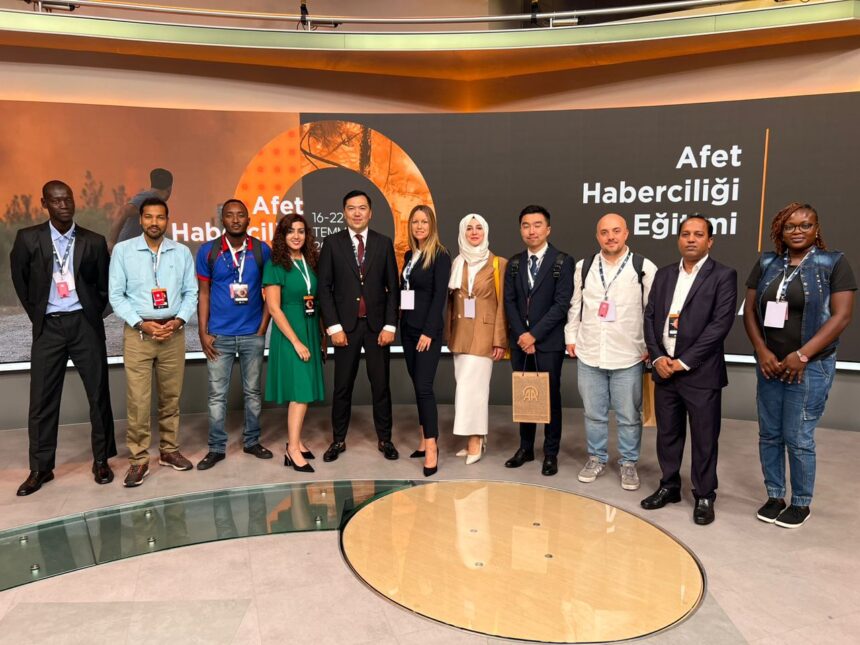ANKARA – Fifteen journalists from various countries spent last week in Türkiye, where they were taken through intensive training on disaster reporting.
The Turkish Cooperation and Coordination Agency (TIKA), in collaboration with the Turkish public media agency Anadolu Ajansı (AA), have concluded the first training on disaster journalism aimed at equipping journalists from different countries with essential skills to cover and report on disasters effectively.
The training covered disaster journalism, disinformation and ethics in disaster journalism, preparation for the disaster area and safety of reporters in the area, as well as disinformation and access to reliable information in the disaster area.
They also had sessions on trauma and stress management, first aid and news writing and news language in the disaster area, amongst other topics.
TIKA believes that with natural disasters happening, journalists ought to be equipped with the necessary skills to keep them safe while attending to duty.
“Since the last three years, our country had been hit by many disasters, from wildfires to floods and now the recent earthquake, where we witnessed that it was very difficult for journalists to work in the field because even the conditions were very harsh, and some ethics were required. They had also witnessed terrible scenes that they weren’t prepared for. They endured emotional distress, anger and so forth, and we realised that this required special training,” said Büşra Bağda, the TIKA coordinator of media training.
“So, I brought up the idea, and told our coordinators that we needed to develop a new training module which is disaster journalism training to prepare journalists to work effectively in disaster events. In collaboration with AA, we usually train journalists in war journalism and so on, but disaster journalism is a totally new programme,” she observed.
The training which was held in Ankara comprised five Turkish journalists and one each from 15 different countries, including Namibia, South Africa, the Gambia, Senegal and Somalia.
Regarding the participants, TIKA sent out requests to their coordinators stationed abroad or out of Türkiye, and asked them to identify suitable participants.
“And there was a criteria, for instance journalists with experience in disaster journalism, or their country to have a past history of some sort of natural disasters. So, they sent us around 25 names, and among them we considered the experience of the journalist,” Bağda noted.
“We cannot say that this workshop has taught us journalistic rules again. What was new was how to abide by those rules in a chaotic situation. Speakers during training told us their own experiences, and the difficulties that they went through. We have an idea of how to tackle such a thing if ever it should happen in our country, and I really pray it never happens,” said Alioune Diouf from Senegal.
He said some details and tips shared by the experts during training can be of great use. “Like preparing your own life space in the disaster area, before starting your job, taking care of your own security and health so as to be able to collect the information and avoiding the ‘reporter blindness’, and not to take unnecessary risks because one has to be alive to tell the story,” he continued.
Ethically, one should not interview freshly-saved victims; and finally fact-checking information, as usual,” said Diouf, who has worked as a journalist for the past 27 years for the Senegal national news agency APS, a french acronym of Senegalese press agency.
“Floods are common in Senegal,” he added.
Another participant, Rohey Bittaye from the Gambia, is a journalist working for the Gambia Radio and Television Services. She said the training came at the right time, and offered the opportunity to learn from senior colleagues in the media from photography to ethics of the profession, and how they can better prepare for disaster scenes as well as in promoting responsible journalism during disaster situations.
“The Turkiye earthquake experience was the centre of attention, but disasters are not only limited to earthquakes. For a country like the Gambia, we usually experience disasters such as flooding and fires. The 2022 flood was one of the biggest disasters we experience as a country,” she added.
“Now, this training has exposed me to skills on how to approach disaster situations, whereas I can disseminate the information without hurting the victims emotionally and physically.
“It was not only an opportunity to learn, but also it helped us to network as media professionals for better service delivery,” Bittaye noted.
The training started on 16 July, and came to an end on 22 July with a tour of the city of Ankara.
Other participants came from Kosovo, Croatia, Lebanon, Kyrgyzstan and Montenegro.



